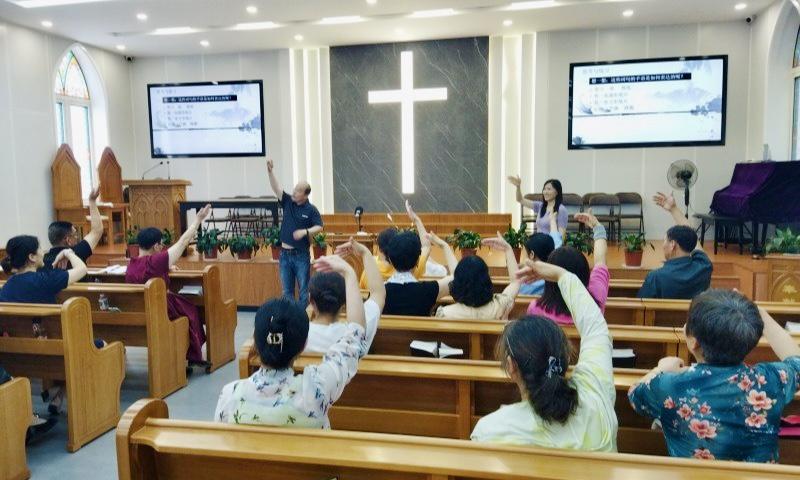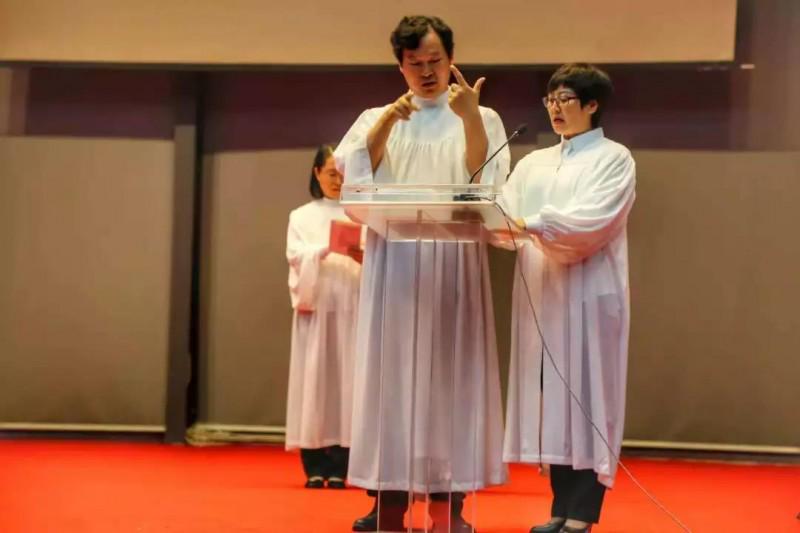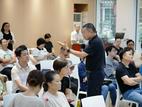They are a silent community.
On city streets, in parks, residential compounds, subways, supermarkets, and even on church pews, they often pass unnoticed. Without intentional attention, their presence can be easily overlooked. They are the deaf and mute.
China alone has an estimated 30 million people with hearing and speech impairments, a population larger than any single Chinese city. Yet, they remain almost invisible amid the noise and pace of society. These are 30 million individuals, each with a heart longing to be understood and accepted.
In Christian missions, there is the concept of "unreached people groups." The deaf and mute are an unreached group hidden in plain sight. Despite their size, they have received limited attention from churches, and the gospel seldom reaches this unique community.
Through the story of Brother Zibu, a full-time minister serving a fellowship of the deaf and mute, we gain a deeper understanding of this special community.
Building Close Connections with the Deaf and Mute Through Service
Brother Zibu once dreamed of being a missionary and regarded Hudson Taylor as his role model. He even joined a missionary team. Yet despite repeated efforts, he was unable to travel out to serve in another place. Later, God led him to a pastor who asked whether he would consider ministering to a disadvantaged group.
"Which group?" he asked.
"The deaf and mute," the pastor replied.
At the time, serving the deaf and mute felt almost unimaginable to him. Still, he did not decline right away; instead, he sought God in prayer. During that prayer, he felt deeply moved and found peace, and he eventually agreed to begin ministry among the deaf and mute.
Because of complex physiological, psychological, and social factors, an invisible barrier often separates the deaf from the hearing. Limited communication leads to misunderstanding and mutual distrust. To build trust with the fellowship's deaf members, Brother Zibu devoted great effort.
"When I first arrived," he recalled, "there were always many dishes to wash after the Sunday meal, and I took the initiative to do it. They thought I was a preacher who had come to shepherd them, so they respected me, but their respect came with distance. I would take the initiative to do the work instead of only preaching or teaching; they gradually realized I wasn't there out of obligation, nor did I carry any sense of superiority."
For him, genuinely "integrating into the deaf community" is essential, even the key to serving them. Deaf individuals often carry strong defenses and struggle to trust others. Yet through persistent care and efforts, the deaf members of the fellowship slowly opened their hearts and fully welcomed him.
Characteristics of the Deaf and Mute Community
Among vulnerable groups, such as the blind, the physically disabled, the intellectually disabled, and those with mental or physical illnesses, the deaf and mute are a very unique community.
Hearing and speaking are very important, as they enable one to communicate normally with other people. While most disadvantaged groups share a common language with able-bodied people and face little information disparity, the deaf and mute rely almost entirely on sign language, which creates a communication barrier. Therefore, there are notable differences from hearing people in areas such as thinking patterns and values. As a result, many experience psychological challenges and deep emotional wounds.
Due to limitations in communication and comprehension, employment opportunities for the deaf and mute are extremely restricted. Suitable positions are few and typically involve simple, repetitive work, such as factory assembly line jobs, yet even these roles are not accessible to all.
Those who have jobs often earn low wages, making them highly cautious about their finances. As a result, deaf and mute believers rarely make large contributions to churches or fellowships and are particularly sensitive about giving.
Brother Zibu has also observed a general pattern within the deaf and mute community: they tend to be extremely careful about small matters but easily confused when it comes to major issues.
"When I was learning sign language," he shared, "I met a deaf-mute man who had been scammed out of 40,000 to 50,000 yuan and the online loans he had taken by another deaf-mute person. He had been convinced to invest in an allegedly high-profit project. Yet this same man would calculate every small expense when eating out and hesitated to donate even 100 yuan to the fellowship. He was a typical example."
Brother Zibu explained, "It is difficult for deaf and mute individuals to think deeply. Their confusion about major matters stems largely from limited access to information in daily life, which results in a narrow understanding and relatively simple, sometimes naïve, patterns of thought."
Silent Worship
Unlike the lively atmosphere in gatherings of hearing Christians, worship among deaf and mute believers is very quiet.
Their order of service is basically the same as that of hearing congregations, with the only difference being that spoken language is replaced by sign language.
According to Brother Zibu, praise is conducted in the following way: a worship video is played on a large screen, he interprets it into sign language, and the deaf and mute believers respond in sign language.
Can deaf and mute individuals worship simply by reading lyrics on a screen? Brother Zibu believes this is difficult. Only a small percentage are literate; most cannot read. Even for those who can read, their understanding of written language is only at a basic level, making sign language far more effective for worship.
Sermons in the deaf-mute fellowship are also delivered through sign language. Brother Zibu usually preaches directly in sign language. At times, other pastors are invited to preach; they speak orally while he interprets into sign language.
However, sign language proficiency varies widely among deaf and mute individuals, and the use of Christian terms often makes the sermons difficult for some to understand. Christian sign vocabulary is unfamiliar to many in the broader deaf community. Therefore, when studying sign language, Brother Zibu deliberately learned not only general and everyday signs but also specialized Christian terminology, considering his evangelistic work.
Deaf and mute people are highly visually sensitive. In pastoral care, "they receive information primarily through sight, so visual methods are most effective," he explained. "When ministering to deaf and mute believers, it is best to communicate in the form of stories, as this helps them understand more easily."
The Current Situation and Needs of Deaf and Mute Christians in China
Referring to the challenges of ministering to the deaf and mute community, Brother Zibu describes the greatest as "The harvest is plentiful, but the workers are few."
"To serve the deaf and mute," he explained, "one must first receive theological training, then learn sign language, and finally reach out to the community. It also requires dedicated effort to integrate fully into their world and become one with them. Very few people engage in this ministry today. Some lack the vision, while others, though they may have the vision, feel that the threshold is too high and the cost too great, as it is difficult to see results in a short time."
Among deaf and mute Christians, very few can attend churches or fellowships for the deaf and mute. What about those who do not have access to such communities?
Brother Zibu noted that some deaf and mute believers are unable to attend services at all, while others visit hearing churches and rely solely on reading sermon slides and brief pastoral care. However, this type of pastoral support has a limited impact.
"Many deaf and mute Christians simply attend Sunday services, sit through the sermon while following the PowerPoint, and then leave," Brother Zibu said. "There is no fellowship with other believers and no meaningful interaction with the pastor."
Through years of ministry, Brother Zibu has observed the numerous challenges they face. Accessing medical care and legal assistance is often difficult, leaving them in urgent need of support. Additionally, deafness and muteness can be hereditary, and marriages among deaf-mute individuals often result in children who may be either deaf-mute or hearing.
Brother Zibu's Future Plans
"My current plan is quite simple," he said, "The priority is to build a solid foundation for the fellowship and shepherd its members."
"If churches are willing to participate in ministry for the deaf and mute, we can collaborate. I can also provide training to help them establish their own deaf-mute fellowships. Ministry among the deaf and mute holds great potential. A major city may not have a church dedicated to the deaf and mute, but it certainly has many deaf and mute residents."
In Brother Zibu's view, the most promising path forward is for deaf-mute believers themselves to rise and serve. "They understand one another naturally because they share the same experiences. Hearing people can serve as overseers, offering broader and directional guidance. Deaf-mute individuals may make mistakes in minor details, which is normal and not a problem," he said.
Among China's nearly 30 million deaf and mute people, countless souls still quietly await the good news from the gospel. Brother Zibu's story reminds us that the deep divide between the hearing and the deaf and mute is not beyond bridging—it requires not pity, but understanding; not charity, but companionship.
Originally published by the Christian Times
- Edited by Katherine Guo and translated by Poppy Chan












